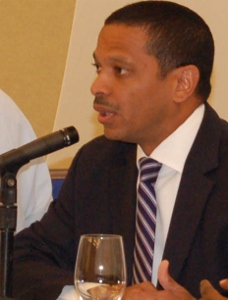Archive for April 17th, 2012

Cayman’s London office rep under fire in UK press
 (CNS Business): Lord Blencathra, the director of Cayman Islands London Office, has been criticised in the UK for lobbying on behalf of Cayman’s financial services industry while, as a member of the House of Lords, he is able to vote on legislation affecting the territory. "It can't be right for a member of the legislature, responsible for setting tax policy, to be employed by a well-known tax haven," Shadow Cabinet minister Jon Trickett told the Independent yesterday. However, the British peer maintained that he had been meticulous in ensuring that there was no conflict of interest between his role as lobbyist and his duties in the Lords. "You cannot point to one single incident, speech, vote or question where I have sought to advance the Cayman Islands in the Lords," he told the UK press. Read more on CNS Business
(CNS Business): Lord Blencathra, the director of Cayman Islands London Office, has been criticised in the UK for lobbying on behalf of Cayman’s financial services industry while, as a member of the House of Lords, he is able to vote on legislation affecting the territory. "It can't be right for a member of the legislature, responsible for setting tax policy, to be employed by a well-known tax haven," Shadow Cabinet minister Jon Trickett told the Independent yesterday. However, the British peer maintained that he had been meticulous in ensuring that there was no conflict of interest between his role as lobbyist and his duties in the Lords. "You cannot point to one single incident, speech, vote or question where I have sought to advance the Cayman Islands in the Lords," he told the UK press. Read more on CNS Business

Ministry to measure local health risks
 (CNS): Health Minister Mark Scotland opened a regional meeting of chief medical officers Monday with a call to improve healthcare throughout the Caribbean, while announcing that next month his ministry will undertake a risk-factor survey. CMOs and other officials from 13 countries are attending the two-day CARICOM meeting, which Scotland told the gathering was about “identifying priority health areas and promoting technical cooperation among all of us so that we can all optimize our resources”.
(CNS): Health Minister Mark Scotland opened a regional meeting of chief medical officers Monday with a call to improve healthcare throughout the Caribbean, while announcing that next month his ministry will undertake a risk-factor survey. CMOs and other officials from 13 countries are attending the two-day CARICOM meeting, which Scotland told the gathering was about “identifying priority health areas and promoting technical cooperation among all of us so that we can all optimize our resources”.
Joining Scotland to open the conference, being held for the first time in Cayman, were Dr. Rudolph Cummings, Programme Manager, Health Sector Development, CARICOM Secretariat, and Dr. Delroy Jefferson, CMO of the Cayman Islands. As he opened the conference, Scotland said that it marked the 20th such meeting of CMOs, and the knowledge that participants gain could be used to influence relevant legislation and policies in their home countries.
“As you join here this week to discuss some of the region’s more pressing health issues, you are sure to gain invaluable knowledge and new insights which you can take back to your legislators and policy makers so that these issues can be addressed pro-actively on a regional and global scale,” he said.
Noting that the Cayman Islands is not a full CARICOM member, the minister said that “we have always supported, participated in and certainly benefited from regional health initiatives”.
Scotland added that while participants come from all over the Caribbean, the health issues are comparable. “For while we all hail from different countries with our own unique identities, many of the health challenges we face are very similar: maternal and child health, aging populations, control of non-communicable diseases (NCDs) and injuries, and AIDS prevention and control – to mention a few.”
The issue of NCDs is being addressed locally, Scotland said, as his ministry has recently allocated funds to undertake a health-risk-factor survey in May, with the Pan American Health Organisation assisting in the training for and planning of the exercise. In previously announcing the launch of a committee to establish a framework for the survey, Scotland said the results will allow health professionals to identify specific issues that contribute to the rapid local rise in chronic disease.
PAHO is also assisting in developing Cayman’s National Health Policy and Strategic Health Plan, he said, by providing a consultant to help facilitate the process, which will also start next month.
Following the CMO conference, from 19-21 April, Cayman is hosting for the first time the annual CHRC/CARPHA (Caribbean Health Research Council/Caribbean Public Health Agency) Scientific Conference, which will encompass almost 60 sessions covering research done in each country on such issues as communicable diseases, diabetes, obesity, and nutrition.
The three-day event, the 57th annual symposium, is the largest health research conference in the English-speaking Caribbean, with more than 200 delegates expected to attend, including researchers, policy makers and healthcare providers.
Miller calls for Dart invoice
(CNS): The Independent member for North Side has called on the Dart Group to release the invoice that it received from government for the $5 million it paid recently before the ForCayman Alliance Investment deal had been agreed. Speaking at a public meeting in West Bay on Thursday hosted by activists against the closure of the West Bay Road and the crown land swap, Ezzard Miller challenged the developer to show the documentation explaining that cash payment. He said the proposed investment alliance was not a good deal and suggested that Dart was getting ten times the value that government and the people of Cayman would get out of the agreement.
Miller said the group’s failure to wait on the findings of the review and just go ahead and start work on the Esterley Tibbetts Road extension showed a lack of respect for the wishes of the Caymanian people. He said he wanted Dart to produce the invoice for the payment it made to government as part of this side agreement between it, the National Roads Authority and the government.
“I want Mr Dart to publish the invoice from government for the $5 million. If the government has not given him an invoice, it is a payment for something they don’t want us to know about,” he told the people at the meeting. “Produce the invoice for the $5 million so the people of this country can know why you paid the Cayman Islands Government $5 million in the middle of the review team reviewing the road project.”
He pointed out that the closure of the West Bay road would bring Dart billions of dollars in future as it would create significant beach front property for the group. Miller said it was time to start demanding a say in these issues. The independent member said the entire Dart deal was put together the wrong way because government should have spoken to the people of West Bay about closing the West Bay Road and giving away land before it spoke to Dart, Miller stated.
“It is time to start to do things for Caymanians … it is time to stop doing things for everyone else and we just tag along,” he added. Miller told the people not to back down on this fight and to stand up for their children and grandchildren. The independent member pointed out that through perseverance, the Eastern Sea Port had been stopped, the referendum had been announced and so the fight to stop the closure of the West Bay Road had to continue until that was won.
Miller took aim at the premier and said the people could not place any trust in anything he was telling them. Bush had stated just a few weeks ago that the referendum on one man, one vote would be too expensive; the premier had claimed that the proposed November ballot held separately from a general election would cost around $750,000. However, on Wednesday the premier revealed that the referendum he was now planning for July would cost only $300,000, Miller noted.
Compared to previous meetings and the recent motorcade, the people gathered on the empty lot opposite Fosters were largely supporters but the activists pressed on with their presentations regardless. Railing against the deal government is proposing to enter into with the islands’ biggest developer, the speakers vowed not to give up the fight.
The meeting brought together representatives of the West Bay Action Committee, Save Cayman, the Concerned Citizens Group and the Coalition to Keep Bodden Town Dump Free — the four major campaign groups opposed to the Dart deal — as well as East End MLA Arden McLean and Miller, who both called on the people not to accept what government was proposing.

Report exposes more failures
 (CNS): A UK expert who reviewed the Cayman Islands Public Management and Finance Law (PMFL) has pointed to the lack of consolidated government accounts as its biggest failing and urged government to rectify this problem with the closure of this year’s accounts as soon as possible. A report by Keith Luck, the former director general finance at the FCO, was released by the Governor’s Office on Friday following an FOI request by CNS and reveals further details of the failure of the Cayman government to account for its spending. Luck pointed to poor understanding and leadership and said the people of Cayman “are without their key controls” because of the failures, and recommended a radical simplification of the system.
(CNS): A UK expert who reviewed the Cayman Islands Public Management and Finance Law (PMFL) has pointed to the lack of consolidated government accounts as its biggest failing and urged government to rectify this problem with the closure of this year’s accounts as soon as possible. A report by Keith Luck, the former director general finance at the FCO, was released by the Governor’s Office on Friday following an FOI request by CNS and reveals further details of the failure of the Cayman government to account for its spending. Luck pointed to poor understanding and leadership and said the people of Cayman “are without their key controls” because of the failures, and recommended a radical simplification of the system.
“A significant concern is the absence of robust Departmental Accounts, but it is the lack of Consolidated Accounts for Government, let alone an Entire Public Sector (EPS) Account, that has to be the biggest failing. Without these the Government and people of the Cayman Islands are without their key controls,” Luck said in the executive summary of his comprehensive report. “My principal recommendation however is a strategy of radical simplification. This needs to begin alongside closure of this year’s accounts. It will require a rigorous and resolute focus on simplification, standardisation and burden reduction.”
The British bureaucrat said government had to get back to basics and then re-build, and strongly recommended that the extent to which outputs and output reporting are used to control and drive appropriations is seriously examined.
Luck found that IRIS, government’s core accounting and information system, had contributed to the difficulties in PMFL but these were symptomatic of wider governance issues. While accrual accounting was now embedded in the system, it was not fully implemented and “understanding is still low in some areas even amongst senior managers,” he said. Luck found that capital accounting still operates on a quasi-cash basis and compliance with International Accounting Standards was inconsistent.
Although less adjustment was required to the human resources element of government, he said that performance management was the biggest challenge and that reform would improve behaviour and outcomes across the civil service.
In his report Luck pointed to weaknesses in leadership and a lack of management sanctions, which meant no one was held to account for the failures. The lack of effective performance management and appraisal was an issue, along with the failure by management to properly delegate. “Some Ministries still double-check and micro-manage which adds to bureaucracy and reduces efficiency,” Luck stated.
The former FCO top accountant also revealed that the Public Sector Investment Committee (PSIC), which should oversee Capital Project Appraisals for all projects over CI$300,000, has never met, despite being mandated in Part XII and Schedule 5 of the Financial Regulations
Of the many observations Luck makes about the PMFL and the subsequent reforms of the system which have led to the pressing problems is the abject failure of government to publish its accounts.
“The most telling indictment of the reforms is the simple fact that the Government, regardless of the party in power, has been unable to fulfil its legal duty to lay accounts in the Legislative Assembly since the reforms were introduced. These missing individual Departmental and Consolidated accounts date back in some cases to July 2003,” he observed.
See the full Luck report below.

Backbencher encourages alternative energy use
 (CNS): With the increase in energy costs and a need for environmental responsibility, government has accepted a private member’s motion to eliminate imposed restrictions by power providers on the domestic generation of renewable energy and send it back to the grid on a net metering basis. The motion brought by the West Bay UDP member Cline Glidden seeks to make it easier for people and businesses to use wind, solar or other renewable power while still on the local CUC grid, feeding excess power back when it is not needed and buy it back when it is at the same rate.
(CNS): With the increase in energy costs and a need for environmental responsibility, government has accepted a private member’s motion to eliminate imposed restrictions by power providers on the domestic generation of renewable energy and send it back to the grid on a net metering basis. The motion brought by the West Bay UDP member Cline Glidden seeks to make it easier for people and businesses to use wind, solar or other renewable power while still on the local CUC grid, feeding excess power back when it is not needed and buy it back when it is at the same rate.
The goal is to eliminate fuel bills for green consumers as presently they are restricted in the amount of renewable energy people can move back and forth to CUC.
Speaking in the Legislative Assembly last week, Glidden toldhis parliamentary colleagues that net metering would give people a way to reduce the strain of energy bills in face of the high cost of living as they were fast becoming the second, if not the largest, bill in the house. As Cayman is dependent on oil price fluctuations and the challenges that come with that, he said, encouraging people to install alternative energy options at home would cut costs, reduce the islands’ carbon footprint and create new jobs.
He acknowledged that CUC had made various efforts to encourage people to reduce their consumption and introduced the CORE and FITS programmes to deal with renewable energy. But while they have their benefits, he said, not many people had taken them up as there were too many challenges that were discouraging to the regular consumer.
The latest one is the feed-in tariff system, he said, but all electricity consumers had to be allowed to be as creative as possible about energy use to reduce fossil fuel dependence and Cayman needed to do more to encourage people to turn towards renewable energies. He said he did not want to eliminate the feed and tariff option for people that were interested in the commercial generation of power for sale to CUC, but for people who had their own turbines or panels at their home or business a better system was needed.
As he expanded on his motion in the debate, Glidden said that what he wanted to propose was a system that would allow a home owner to generate their own electricity via solar or wind, and sell back any extra power to CUC at the same rate as it would buy it from the grid, making a net zero bill at the end of the month.
He said that some people had already made significant investments in solar and wind systems and needed to be able to feed back to CUC without limits and at a fair rate, and therefore the limits needed to be removed. The MLA said he wanted people to be able to send power to CUC during theday and buy it back in the evening and eliminate the need for them to have to spend thousands of dollars on batteries, making the purchase of wind and solar power systems even more attractive.
Glidden said his proposal might well have an impact on CUC earnings but it would be beneficial for consumers and would encourage the development of an alternative energy business.
“This motion seeks to take away restrictions and encourage individuals to benefit …reducing their costs and dependence on fossil fuels, making us more environmentally friendly and providing jobs for those installing the systems,” he said.
The deputy premier, who has responsibility for energy, said that the government supported the motion and was already working on the issues Glidden had raised and it would form part of the energy policy which would be revealed later this year.